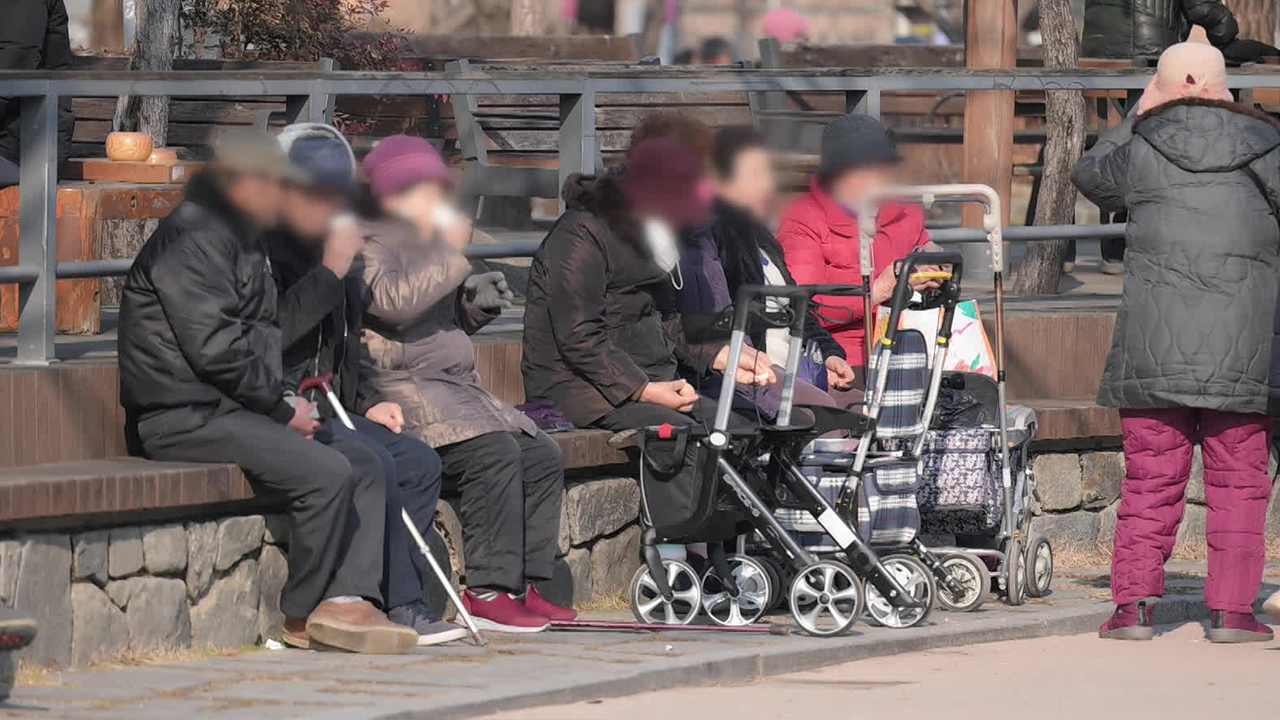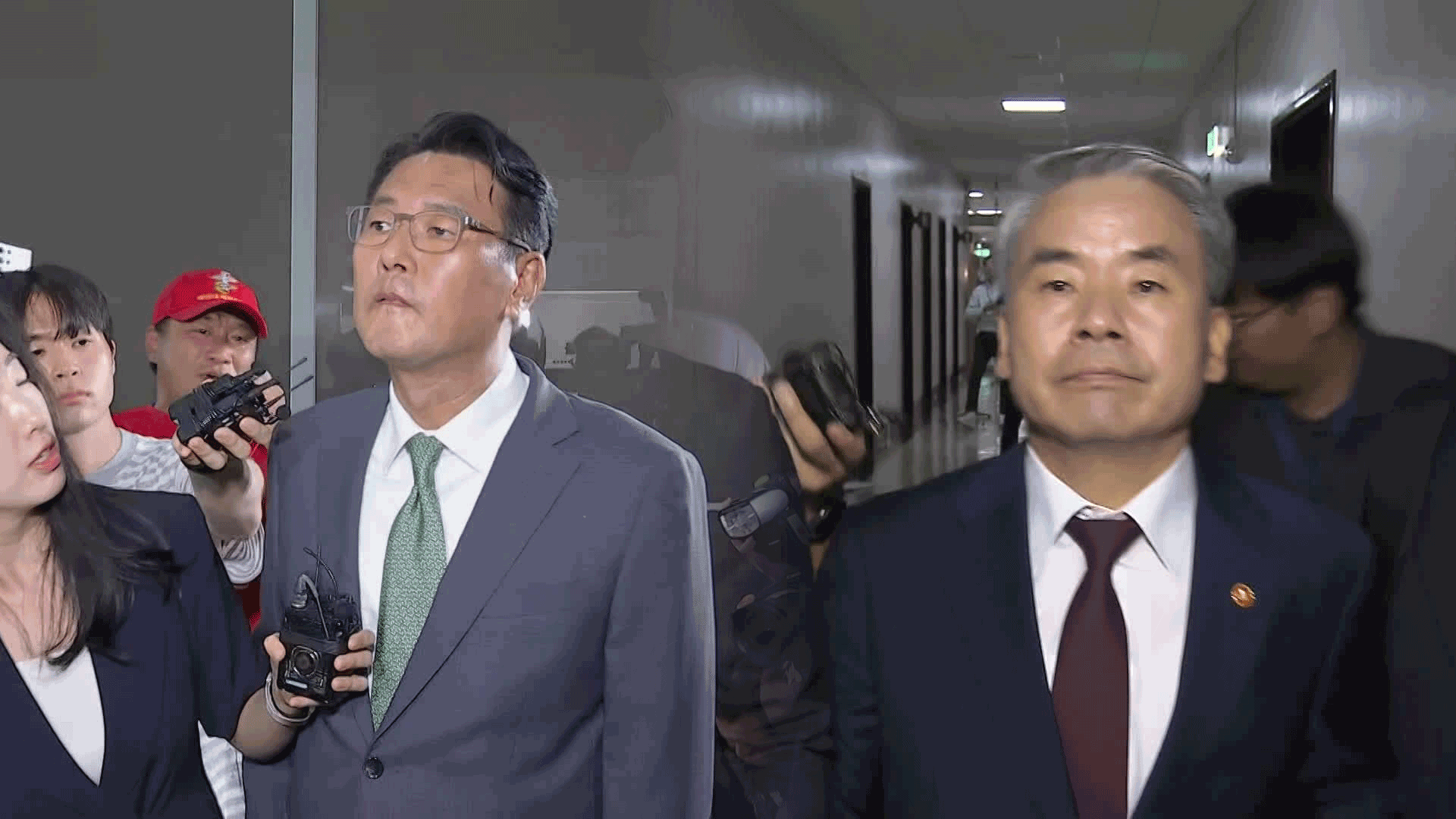[Anchor]
According to internationally recognized standards, if the proportion of the population aged 65 and older exceeds 7%, it is classified as an aging society; if it exceeds 14%, it is classified as an aged society; and if it exceeds 20%, it is classified as a super-aged society.
Our country entered an 'aging society' in 2000, and in 2017, the proportion of elderly people doubled, leading to the entry into an 'aged society.'
And yesterday (12.23), the proportion of those aged 65 and older in the registered population surpassed 20%, marking the beginning of a 'super-aged society.'
While Austria took 53 years, the UK took 50 years, and Japan took 10 years to transition from an aging society to a super-aged society, our country took only 7 years.
The government initially expected to enter a super-aged society next year, but the pace of aging has been faster than anticipated.
As we face the reality of a super-aged society, how should we respond? Reporter Kim Min-kyung has the details.
[Report]
65-year-old Park Young-sook, who used to run a daycare center, has been working as a barista at this café since the beginning of this year.
She has started a new chapter in her life at a café created by a district office in Seoul to generate jobs for the elderly.
[Park Young-sook/Mapo District, Seoul: "I wondered if I could really do something like that, but after receiving training, I found the work to be very enjoyable..."]
The number of elderly people aged 65 and older who have jobs is increasing every year.
However, a significant portion of these jobs are low-wage positions, such as simple labor or temporary jobs.
Discussions on expanding quality job opportunities for the elderly are urgently needed.
Currently, discussions are expected to intensify regarding the extension of the legal retirement age, which is currently set at 60.
Due to the population cliff, the working-age population is decreasing while the elderly population is increasing, raising concerns about a shrinking labor force.
[Kim Jeong-seok/President of the Population Association of Korea: "They keep saying 'the workforce is disappearing,' but at this point, we need to seriously consider how to utilize those individuals as resources..."]
However, a uniform extension of the retirement age could lead to increased costs for businesses and intergenerational conflicts due to reduced hiring opportunities for young people.
Additionally, whether to raise the age threshold for various elderly welfare standards also requires social consensus.
[Jeong Soon-dul/Professor of Social Welfare at Ewha Womans University: "The most important aspects are related to jobs, opportunities for healthy activities, and how to establish a care system as people age..."]
Although we have already entered a super-aged society, the establishment of a new population strategy planning department announced by the government last July has lost momentum amid the impeachment situation.
This is KBS News, Kim Min-kyung.
According to internationally recognized standards, if the proportion of the population aged 65 and older exceeds 7%, it is classified as an aging society; if it exceeds 14%, it is classified as an aged society; and if it exceeds 20%, it is classified as a super-aged society.
Our country entered an 'aging society' in 2000, and in 2017, the proportion of elderly people doubled, leading to the entry into an 'aged society.'
And yesterday (12.23), the proportion of those aged 65 and older in the registered population surpassed 20%, marking the beginning of a 'super-aged society.'
While Austria took 53 years, the UK took 50 years, and Japan took 10 years to transition from an aging society to a super-aged society, our country took only 7 years.
The government initially expected to enter a super-aged society next year, but the pace of aging has been faster than anticipated.
As we face the reality of a super-aged society, how should we respond? Reporter Kim Min-kyung has the details.
[Report]
65-year-old Park Young-sook, who used to run a daycare center, has been working as a barista at this café since the beginning of this year.
She has started a new chapter in her life at a café created by a district office in Seoul to generate jobs for the elderly.
[Park Young-sook/Mapo District, Seoul: "I wondered if I could really do something like that, but after receiving training, I found the work to be very enjoyable..."]
The number of elderly people aged 65 and older who have jobs is increasing every year.
However, a significant portion of these jobs are low-wage positions, such as simple labor or temporary jobs.
Discussions on expanding quality job opportunities for the elderly are urgently needed.
Currently, discussions are expected to intensify regarding the extension of the legal retirement age, which is currently set at 60.
Due to the population cliff, the working-age population is decreasing while the elderly population is increasing, raising concerns about a shrinking labor force.
[Kim Jeong-seok/President of the Population Association of Korea: "They keep saying 'the workforce is disappearing,' but at this point, we need to seriously consider how to utilize those individuals as resources..."]
However, a uniform extension of the retirement age could lead to increased costs for businesses and intergenerational conflicts due to reduced hiring opportunities for young people.
Additionally, whether to raise the age threshold for various elderly welfare standards also requires social consensus.
[Jeong Soon-dul/Professor of Social Welfare at Ewha Womans University: "The most important aspects are related to jobs, opportunities for healthy activities, and how to establish a care system as people age..."]
Although we have already entered a super-aged society, the establishment of a new population strategy planning department announced by the government last July has lost momentum amid the impeachment situation.
This is KBS News, Kim Min-kyung.
■ 제보하기
▷ 카카오톡 : 'KBS제보' 검색, 채널 추가
▷ 전화 : 02-781-1234, 4444
▷ 이메일 : kbs1234@kbs.co.kr
▷ 유튜브, 네이버, 카카오에서도 KBS뉴스를 구독해주세요!
- S. Korea enters super-aged society
-
- 입력 2024-12-24 23:55:22

[Anchor]
According to internationally recognized standards, if the proportion of the population aged 65 and older exceeds 7%, it is classified as an aging society; if it exceeds 14%, it is classified as an aged society; and if it exceeds 20%, it is classified as a super-aged society.
Our country entered an 'aging society' in 2000, and in 2017, the proportion of elderly people doubled, leading to the entry into an 'aged society.'
And yesterday (12.23), the proportion of those aged 65 and older in the registered population surpassed 20%, marking the beginning of a 'super-aged society.'
While Austria took 53 years, the UK took 50 years, and Japan took 10 years to transition from an aging society to a super-aged society, our country took only 7 years.
The government initially expected to enter a super-aged society next year, but the pace of aging has been faster than anticipated.
As we face the reality of a super-aged society, how should we respond? Reporter Kim Min-kyung has the details.
[Report]
65-year-old Park Young-sook, who used to run a daycare center, has been working as a barista at this café since the beginning of this year.
She has started a new chapter in her life at a café created by a district office in Seoul to generate jobs for the elderly.
[Park Young-sook/Mapo District, Seoul: "I wondered if I could really do something like that, but after receiving training, I found the work to be very enjoyable..."]
The number of elderly people aged 65 and older who have jobs is increasing every year.
However, a significant portion of these jobs are low-wage positions, such as simple labor or temporary jobs.
Discussions on expanding quality job opportunities for the elderly are urgently needed.
Currently, discussions are expected to intensify regarding the extension of the legal retirement age, which is currently set at 60.
Due to the population cliff, the working-age population is decreasing while the elderly population is increasing, raising concerns about a shrinking labor force.
[Kim Jeong-seok/President of the Population Association of Korea: "They keep saying 'the workforce is disappearing,' but at this point, we need to seriously consider how to utilize those individuals as resources..."]
However, a uniform extension of the retirement age could lead to increased costs for businesses and intergenerational conflicts due to reduced hiring opportunities for young people.
Additionally, whether to raise the age threshold for various elderly welfare standards also requires social consensus.
[Jeong Soon-dul/Professor of Social Welfare at Ewha Womans University: "The most important aspects are related to jobs, opportunities for healthy activities, and how to establish a care system as people age..."]
Although we have already entered a super-aged society, the establishment of a new population strategy planning department announced by the government last July has lost momentum amid the impeachment situation.
This is KBS News, Kim Min-kyung.
According to internationally recognized standards, if the proportion of the population aged 65 and older exceeds 7%, it is classified as an aging society; if it exceeds 14%, it is classified as an aged society; and if it exceeds 20%, it is classified as a super-aged society.
Our country entered an 'aging society' in 2000, and in 2017, the proportion of elderly people doubled, leading to the entry into an 'aged society.'
And yesterday (12.23), the proportion of those aged 65 and older in the registered population surpassed 20%, marking the beginning of a 'super-aged society.'
While Austria took 53 years, the UK took 50 years, and Japan took 10 years to transition from an aging society to a super-aged society, our country took only 7 years.
The government initially expected to enter a super-aged society next year, but the pace of aging has been faster than anticipated.
As we face the reality of a super-aged society, how should we respond? Reporter Kim Min-kyung has the details.
[Report]
65-year-old Park Young-sook, who used to run a daycare center, has been working as a barista at this café since the beginning of this year.
She has started a new chapter in her life at a café created by a district office in Seoul to generate jobs for the elderly.
[Park Young-sook/Mapo District, Seoul: "I wondered if I could really do something like that, but after receiving training, I found the work to be very enjoyable..."]
The number of elderly people aged 65 and older who have jobs is increasing every year.
However, a significant portion of these jobs are low-wage positions, such as simple labor or temporary jobs.
Discussions on expanding quality job opportunities for the elderly are urgently needed.
Currently, discussions are expected to intensify regarding the extension of the legal retirement age, which is currently set at 60.
Due to the population cliff, the working-age population is decreasing while the elderly population is increasing, raising concerns about a shrinking labor force.
[Kim Jeong-seok/President of the Population Association of Korea: "They keep saying 'the workforce is disappearing,' but at this point, we need to seriously consider how to utilize those individuals as resources..."]
However, a uniform extension of the retirement age could lead to increased costs for businesses and intergenerational conflicts due to reduced hiring opportunities for young people.
Additionally, whether to raise the age threshold for various elderly welfare standards also requires social consensus.
[Jeong Soon-dul/Professor of Social Welfare at Ewha Womans University: "The most important aspects are related to jobs, opportunities for healthy activities, and how to establish a care system as people age..."]
Although we have already entered a super-aged society, the establishment of a new population strategy planning department announced by the government last July has lost momentum amid the impeachment situation.
This is KBS News, Kim Min-kyung.
-
-

김민경 기자 mkdream@kbs.co.kr
김민경 기자의 기사 모음
-
이 기사가 좋으셨다면
-
좋아요
0
-
응원해요
0
-
후속 원해요
0















이 기사에 대한 의견을 남겨주세요.